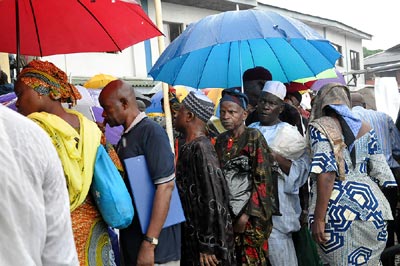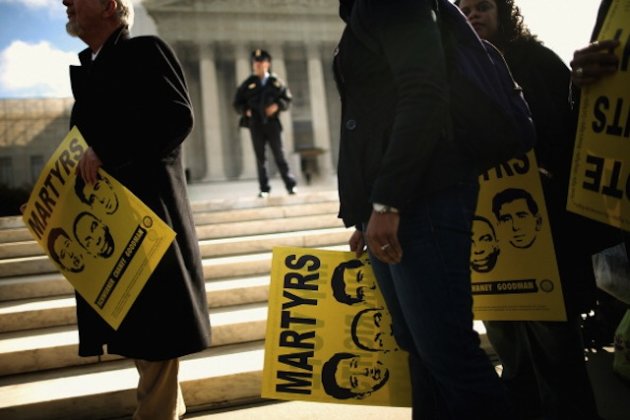Early July is about more than fireworks, cookouts and long weekends. It's also about hundreds of new state laws.
Around the nation, July 1 marks the start of new fiscal years and the date recently passed legislation goes into effect, although states often mark their independence by enacting new regulations on their own calendars.
The laws and effective dates vary somewhat from state to state, but an overview of legislation set to hit the books Monday shows that state lawmakers took positions on the following five topics of national debate:
? GUNS: State legislatures across the U.S. discussed gun laws in the wake of mass shootings that shocked the nation in 2012. Most efforts to pass restrictions faded amid fierce opposition. Only a handful of states enacted new limits, some of which go into effect Monday. Among them Colorado is notable for requiring background checks for private and online gun sales and outlawing high-capacity ammunition magazines. At least 18 states, however, have gone the other way and loosened gun laws. Kansas laws set to take effect will allow schools to arm employees with concealed handguns and ensure that weapons can be carried into more public buildings.
? TECH: Dozens of states examined technology laws. Recently passed legislation in eight states will prevent businesses from demanding passwords to social media sites as a condition of employment. The law in Washington state also stops employers from compelling workers to add managers as "friends" so their profile can be viewed. Four states updated tech laws to allow drivers to show proof of car insurance on an electronic device, such as a smartphone.
? CARS: A handful of states have restricted cellphone use while driving. Starting Monday in Hawaii and West Virginia motorists will have to put down handheld devices. Meanwhile, in South Dakota beginning drivers will face similar restrictions. Utah also enacted limits for newbies with a law that has already taken effect. A few states have banned texting while driving. Other state laws affecting drivers will make it illegal to smoke in a car with a child, raise highway speed limits, crackdown on drunken drivers and raise gas taxes.
? ABORTION: Nationally, state lawmakers proposed more than 300 bills that would have restricted abortions, according to the American Civil Liberties Union. At least 13 state legislatures passed new limits, though two are waiting for governors to sign off. Notably, a bill that would have closed almost every abortion clinic in Texas was dramatically defeated by a Democratic filibuster and a restless crowd in late June. The Texas governor, however, has ordered another special legislative session to push the bill through. North Dakota has passed the nation's strictest abortion law, which takes effect in August, banning abortions after six weeks of pregnancy.
?DRONES: An Idaho law taking effect Monday forbids anyone from using an unmanned aircraft for spying on another. Virginia has passed a ban preventing authorities from using drones for the next two years, according to the National Conference of State Legislatures. Four other states approved anti-drone regulations, though legislation aimed at law enforcement in Texas isn't effective until fall.
___
Not all of the measures set to take effect were matters dominating national political discussion. The following five examples of recently approved legislation show state-level updates can cover a variety of topics:
? SEXIST LANGUAGE: Washington lawmakers are completing work to strip the state's books of sexist language. References to "his" will be changed to "his or her," college "freshmen" will become "first-year students" and "penmanship" will be called "handwriting."
? JACKPOT: Wyoming residents might soon consider 7, 1 and 13 as lucky numbers. A Cowboy State law kicking in Monday calls for the state to establish a lottery for the first time, leaving a dwindling list of only a handful of states without such a prize drawing.
? ELECTION DAY DRINKING: Kentucky has lifted a ban on election day drinking. It was one of the last states with Prohibition-era restrictions on the sale of alcohol while polls are open.
? EDIBLE LANDSCAPING: Maine lawmakers this session have directed officials to plant edible landscaping, such as fruit trees or berry shrubs, around the Statehouse.
? TANNING: Dozens of states this year considered keeping minors out of tanning beds. New Jersey and Nevada restrictions kick in July 1, and an Oregon limit takes effect in January. The home of MTV's reality series "Jersey Shore" and its famously bronzed cast, however, took the law beyond sun lamps to block anyone younger than 14 from getting even a spray tan.
___
Associated Press writers Lauren Gambino in Salem, Ore., and Greg Moore in Phoenix contributed to this report.
Source: http://news.yahoo.com/news-laws-kick-around-nation-july-1-182155218.html
oklahoma city bombing Audrie Pott Bombing In Boston Rebel Wilson Patriots Day aubrey plaza boston marathon

 I recently stumbled upon one of the latest entries to the Wizards of the Coast?s transmedial world that is the Magic: The Gathering franchise. I have a history with MtG, although it is a very small one. I have played the game for a year when I was about 13 years old. My impression of it was that it was a highly enjoyable and strategically deep game, that costed a ton of money (that I was not able to invest into it). Also, it is important to realize here that I played the game somewhat isolated since it was a very niche hobby in the part of Belgium where I lived, and there were no tournaments, trading events or shop selling single cards anywhere near. As a result, the only way I could ever get an elusive Black Lotus, for example, would be by finding it in a booster pack. So needless to say that MtG died out for me as I decided that there were more enjoyable games to spend money on (in my situation back then).
I recently stumbled upon one of the latest entries to the Wizards of the Coast?s transmedial world that is the Magic: The Gathering franchise. I have a history with MtG, although it is a very small one. I have played the game for a year when I was about 13 years old. My impression of it was that it was a highly enjoyable and strategically deep game, that costed a ton of money (that I was not able to invest into it). Also, it is important to realize here that I played the game somewhat isolated since it was a very niche hobby in the part of Belgium where I lived, and there were no tournaments, trading events or shop selling single cards anywhere near. As a result, the only way I could ever get an elusive Black Lotus, for example, would be by finding it in a booster pack. So needless to say that MtG died out for me as I decided that there were more enjoyable games to spend money on (in my situation back then).






 Protesters supporting Edward Snowden, a former contractor at the National Security Agency, hold a photo of himduring a demonstration in Hong Kong on June 13, 2013. Snowden's made a splash in the media, but has he told the truth?
Protesters supporting Edward Snowden, a former contractor at the National Security Agency, hold a photo of himduring a demonstration in Hong Kong on June 13, 2013. Snowden's made a splash in the media, but has he told the truth?
